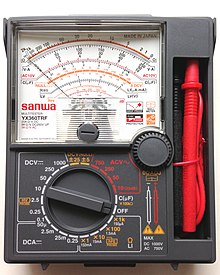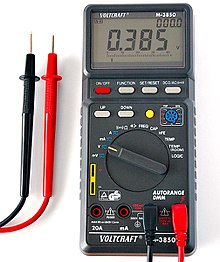
Back مقياس متعدد الأغراض Arabic Мультыметр Byelorussian Мултиметър Bulgarian মাল্টিমিটার Bengali/Bangla Polímetre Catalan Multimetr Czech Multimeter Danish Multimeter German Πολύμετρο Greek Plurmezurilo Esperanto


A multimeter (also known as a volt-ohm-milliammeter, volt-ohmmeter or VOM)[1] is a measuring instrument that can measure multiple electrical properties.[2][3] A typical multimeter can measure voltage, resistance, and current,[4] in which case can be used as a voltmeter, ohmmeter, and ammeter. Some feature the measurement of additional properties such as temperature and capacitance.
Analog multimeters use a microammeter with a moving pointer to display readings.[5] Digital multimeters (DMMs) have numeric displays and are more precise than analog multimeters as a result. Meters will typically include probes that temporarily connect the instrument to the device or circuit under test, and offer some intrinsic safety features to protect the operator if the instrument is connected to high voltages that exceed its measurement capabilities.
Multimeters vary in size, features, and price.[6] They can be portable handheld devices or highly-precise bench instruments.[7]
Multimeters are used in diagnostic operations to verify the correct operation of a circuit or to test passive components for values in tolerance with their specifications.
- ^ Silver, H. Ward (2008). The ARRL Extra Class License Manual for Ham Radio. American Radio Relay League. pp. 6–59. ISBN 978-0-87259-135-6.
- ^ Team, YCT Expert. 2024-25 RRB JE Stage-II Electronics & Allied Engineering Solved Papers. Youth Competition Times. p. 318.
- ^ Experts, Disha. Handbook to SSC JE Electrical. Disha Publications. p. 73.
- ^ SOLANKI, CHETAN SINGH (11 January 2013). SOLAR PHOTOVOLTAIC TECHNOLOGY AND SYSTEMS: A Manual for Technicians, Trainers and Engineers. PHI Learning Pvt. Ltd. p. 13. ISBN 978-81-203-4711-3.
- ^ Experts, Disha (8 March 2018). Basic Science & Engineering for Indian Railways (RRB) Assistant Loco Pilot Exam 2018 Stage II. Disha Publications. p. 37. ISBN 978-93-87421-51-6.
- ^ Kularatna, Nihal (2003). Digital and Analogue Instrumentation: Testing and Measurement. IET. p. 126. ISBN 978-0-85296-999-1.
- ^ Electronic Engineering. Morgan-Grampian. 1984. p. 117.